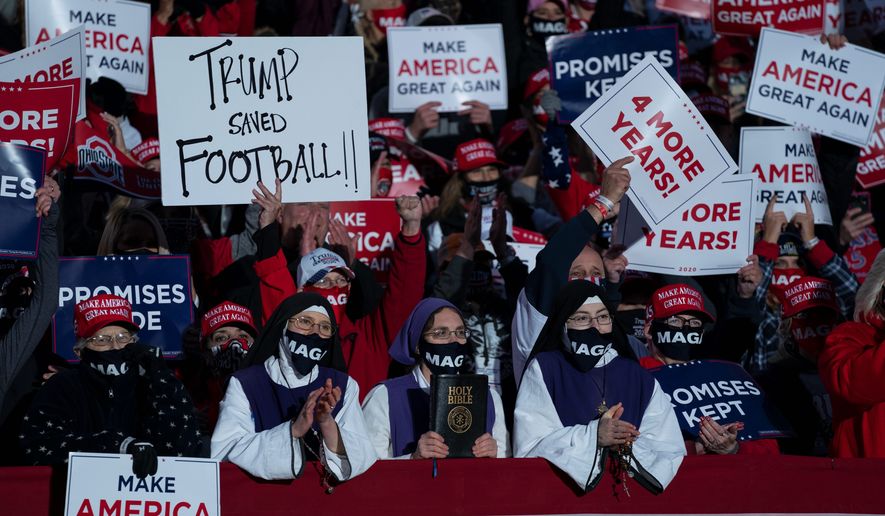A debate is roiling the Catholic Church over the role clergy and nuns play in partisan politics ahead of Tuesday’s elections.
On Sunday, three nuns held rosaries and a Bible behind President Trump at a rally in Ohio. Media outlets quickly dubbed the sisters of the Children of Mary religious community the “MAGA nuns.”
“There are indeed many issues concerning the quality of life that need to be addressed,” the Children of Mary order said in a statement after the event. “However, the preeminent issue is the intrinsic evil of taking innocent human life through abortion.”
They’re far from the first nuns to stand up for Mr. Trump this election season. In August before the Republican National Convention, Sister Dede Byrne, a sister with the Little Workers of the Sacred Hearts of Jesus and Mary, spoke in favor of the president as a bulwark against Democratic nominee Joseph R. Biden and running mate Sen. Kamala Harris, whom the religious sister labeled “the most anti-life presidential ticket ever.”
“His [Mr. Trump’s] belief in the sanctity of life transcends politics,” Sister Byrne said.
The Democrats also brought a nun on stage at their summer convention, Sister Simone Campbell, who recently announced her retirement from the “Nuns on a Bus” social campaign that has doubled as a Democratic campaign vehicle for the last three presidential election cycles. Sen. Sherrod Brown, Ohio Democrat, and Rep. Rosa DeLauro, a Connecticut Democrat, joined Sister Campbell in a virtual rally.
“Catholics cannot be true to their faith and vote for Donald Trump in November,” Sister Campbell wrote in August.
Recent polling data from EWTN/RealClearPolitics shows that 52% of Catholics — even those not attending Mass regularly — support Mr. Biden, compared with 40% for Mr. Trump. But Mr. Biden’s lead evaporates among Catholics who regularly attend Mass.
The vocal debates over Catholic faith, heightened this year with Mr. Biden as only the fourth Catholic presidential candidate, has been fought on pulpits, in homilies and in social media.
“The gospel is political in terms of ethical issues,” said Todd Salzman, professor of Catholic theology at Creighton University. “Now, there’s a fine line on speaking out on ethical issues and advocating for a particular candidate. Those are two different things.”
Mr. Salzman said he could understand how the sisters at Mr. Trump’s rally, who wore masks emblazoned with “MAGA,” would be found “quite offensive” to some Catholics.
This election many clerics have bypassed the traditional line for the tax-exempt Catholic Church and have endorsed or bitterly critiqued Mr. Biden.
Earlier this month, a video of Father Ed Meeks of King Catholic Church in Towson, Maryland, warning in a homily that a Biden victory would “[open] the door for America to become a socialist country” went viral. Father Meeks also questioned Mr. Biden’s Catholicism.
A former Anglican priest, Father Meeks belongs to the Ordinariate of the Chair of St. Peter, which did not respond to a request for comment.
In Wisconsin, Father James Altman has drawn public condemnation after a video surfaced in which the priest preached “[y]ou cannot be a Catholic and be a Democrat.” Last week, he told The Federalist Radio Hour that he was taken aback by “blowback” from within the church.
A spokesperson for the Diocese of La Crosse, Wisconsin, where Father Altman serves, did not respond to a request for comment. In September, La Crosse Bishop William Callahn said he had privately given Father Altman a “correction.”
Ultimately, the individual conscience of Catholic voters, not church officials, should decide which candidates they vote for, the U.S. Conference of Catholic Bishops says in its “faithful citizenship” guidance.
“We recognize that the responsibility to make choices in political life rests with each individual in light of a properly formed conscience,” the document states.
The Leadership Conference of Women Religious, which includes more than 1,300 members among 300 religious congregations, said it sees “wisdom” in the bishops conference’s emphasis on letting individuals make voting decisions independently.
“We believe voters have to decide for themselves which candidates will best uphold the values that they wish to see guide this country and the major decisions before us,” a spokeswoman said via email.
• Christopher Vondracek can be reached at cvondracek@washingtontimes.com.




Please read our comment policy before commenting.